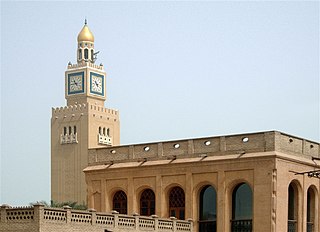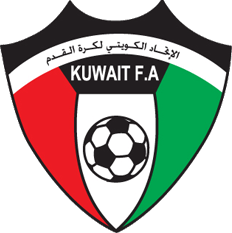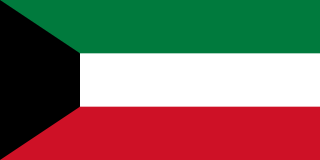Related Research Articles
Kuwait is a sovereign state in Western Asia located at the head of the Persian Gulf. The geographical region of Kuwait has been occupied by humans since antiquity, particularly due to its strategic location at the head of the Persian Gulf. In the eighteenth and nineteenth centuries, Kuwait was a prosperous maritime port city and the most important trade port in the northern Gulf region. In the modern era, Kuwait is best known for the Gulf War (1990–1991).

The economy of Kuwait is a wealthy petroleum-based economy. Kuwait is one of the richest countries in the world. The Kuwaiti dinar is the highest-valued unit of currency in the world. According to the World Bank, Kuwait is the fifth richest country in the world by gross national income per capita. Kuwait's economy is the world's twentieth-largest by GDP per capita. As a result of various diversification policies, petroleum now accounts for 43% of the total GDP and 70% of export earnings. Steel manufacturing is Kuwait's second biggest industry. Kuwait is self-sufficient in steel.

Kuwait City is the capital and largest city of Kuwait. Located at the heart of the country on the south shore of Kuwait Bay on the Persian Gulf, it is the political, cultural and economical centre of the emirate, containing Kuwait's Seif Palace, government offices, and the headquarters of most Kuwaiti corporations and banks. It is one of the hottest cities in summer on earth, with average summer high temperatures over 45 °C (113 °F) for three months of the year.

The House of Sabah is the ruling family of Kuwait.

The Gulf War was a 1990–1991 armed campaign waged by a 35-country military coalition in response to the Iraqi invasion of Kuwait. Spearheaded by the United States, the coalition's efforts against Iraq were carried out in two key phases: Operation Desert Shield, which marked the military buildup from August 1990 to January 1991; and Operation Desert Storm, which began with the aerial bombing campaign against Iraq on 17 January 1991 and came to a close with the American-led Liberation of Kuwait on 28 February 1991.

The Kuwaiti dinar is the currency of Kuwait. It is sub-divided into 1,000 fils.

Kuwait Airways is the national carrier of Kuwait, with its head office on the grounds of Kuwait International Airport, Al Farwaniyah Governorate. It operates scheduled international services throughout the Middle East, to the Indian subcontinent, Europe, Southeast Asia and North America, from its main base at Kuwait International Airport.

The Emir of the State of Kuwait is the monarch and head of state of Kuwait, the country's most powerful office. The emirs of Kuwait are members of the Al Sabah dynasty.

Kuwait International Airport is an international airport located in the Farwaniya Governorate, Kuwait, 15.5 kilometers (9.6 mi) south of the centre of Kuwait City, spread over an area of 37.7 square kilometres (14.6 sq mi). It serves as the primary hub for Kuwait Airways and Jazeera Airways. A portion of the airport complex is designated as Abdullah Al-Mubarak Air Base, which contains the headquarters of the Kuwait Air Force, as well as the Kuwait Air Force Museum.

The Kuwait national football team is the national team of Kuwait and is controlled by the Kuwait Football Association. Kuwait made one World Cup finals appearance, in 1982, managing one point in the group stages. In the Asian Cup, Kuwait reached the final in 1976 and won the tournament in 1980.

The Iraqi invasion of Kuwait was an operation conducted by Iraq on 2 August 1990, whereby it invaded the neighboring State of Kuwait, consequently resulting in a seven-month-long Iraqi military occupation of the country. The invasion and Iraq's subsequent refusal to withdraw from Kuwait by a deadline mandated by the United Nations led to a direct military intervention by a United Nations-authorized coalition of forces led by the United States. These events came to be known as the first Gulf War, eventually resulting in the forced expulsion of Iraqi troops from Kuwait and the Iraqis setting 600 Kuwaiti oil wells on fire during their retreat, as a scorched earth strategy.

Kuwait Sporting Club is a Kuwaiti professional football club based in Kuwait City. The football team has won Kuwaiti Premier League 17 times. Kuwait SC also has over 50 trophies in Kuwaiti Club football history. Kuwait SC plays in the Al Kuwait Sports Club Stadium located in Kaifan, which is the 5th largest stadium in Kuwait. It is the first Kuwaiti club to ever win an Asian title, winning the 2009 AFC Cup, 2012 AFC Cup and 2013 AFC Cup.

The Kuwait Football Association is the governing body of football in Kuwait.
Human rights in Kuwait are a topic of significant concern. Most notably, Kuwait's handling of the stateless Bedoon crisis has come under substantial criticism from international human rights organisations and the United Nations. Kuwait has the largest number of stateless people in the entire region. Kuwait also faces significant criticism for the human rights violations against foreign nationals, women, and LGBT people. Although Kuwaiti law theoretically pledges to protect all human rights; the enforcement mechanisms designed to help protect human rights are very limited in Kuwait.

Kuwait, officially the State of Kuwait, is a country in Western Asia. It is situated in the northern edge of Eastern Arabia at the tip of the Persian Gulf, bordering Iraq to the north and Saudi Arabia to the south. Kuwait also shares maritime borders with Iran. Kuwait has a coastal length of approximately 500 km (311 mi). Most of the country's population reside in the urban agglomeration of the capital city Kuwait City. As of 2022, Kuwait has a population of 4.45 million people of which 1.45 million are Kuwaiti citizens while the remaining 3.00 million are foreign nationals from over 100 countries.
The first bill which would have given women the right to vote in Kuwait was put to the parliament in 1963. It was ultimately overturned due to pressure from conservatives. Bills continued to be denied through 1985 and 1986. Kuwait then became heavily involved in the Iraq-Iran war, and women began demanding recognition for their efforts in keeping their families and society functional. The parliament agreed and the first woman was finally appointed as the ambassador of the Persian Gulf in 1993. In 1996, 500 women stopped working for an hour to show solidarity in their right for suffrage, and demonstrations continued throughout the next 6 years. In May 1999 a decree that allowed women the right to vote and run for office was issued by the emir, however it was overruled again by the parliament 6 months later.

Sabah Al-Ahmad Al-Jaber Al-Sabah was the Emir of Kuwait and Commander of the Kuwait Military Forces from 29 January 2006 until his death in 2020.

The Sheikhdom of Kuwait was a sheikhdom which gained independence from the Khalidi Emirate of Al Hasa under Sabah I bin Jaber in the year 1752. The Sheikhdom became a British protectorate between 1899 and 1961 after the Anglo-Kuwaiti agreement of 1899 was signed between Sheikh Mubarak Al-Sabah and the British government in India due to threats to Kuwait's independence from the Ottoman Empire.
The COVID-19 pandemic in Kuwait is part of the worldwide pandemic of coronavirus disease 2019 caused by severe acute respiratory syndrome coronavirus 2. The first confirmed case in Kuwait was announced on 24 February 2020.